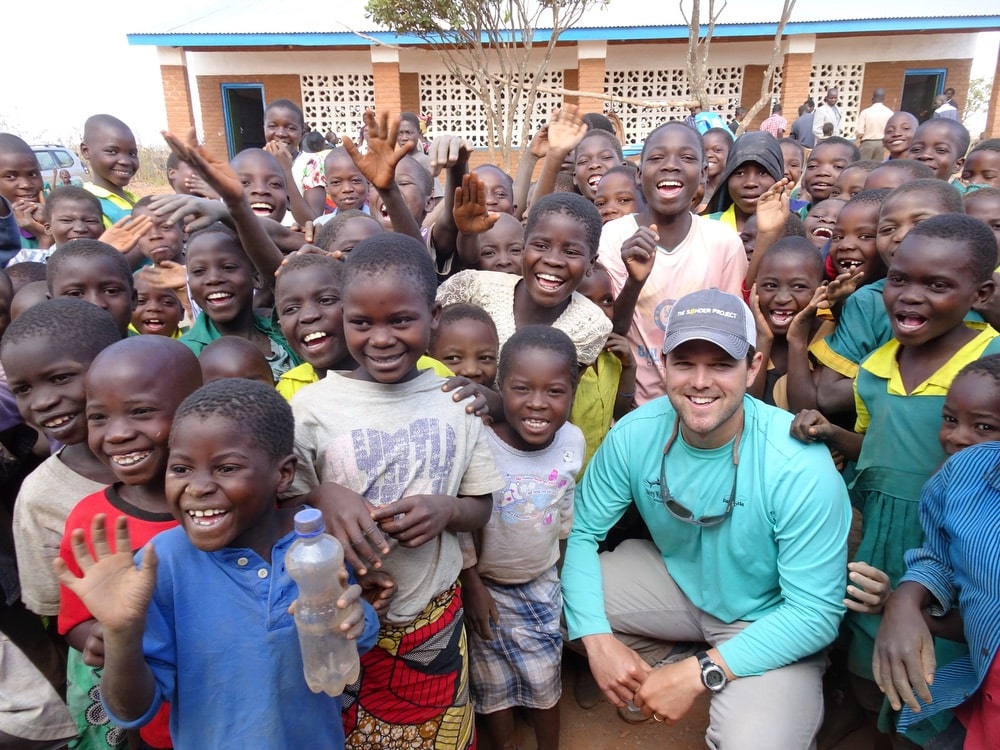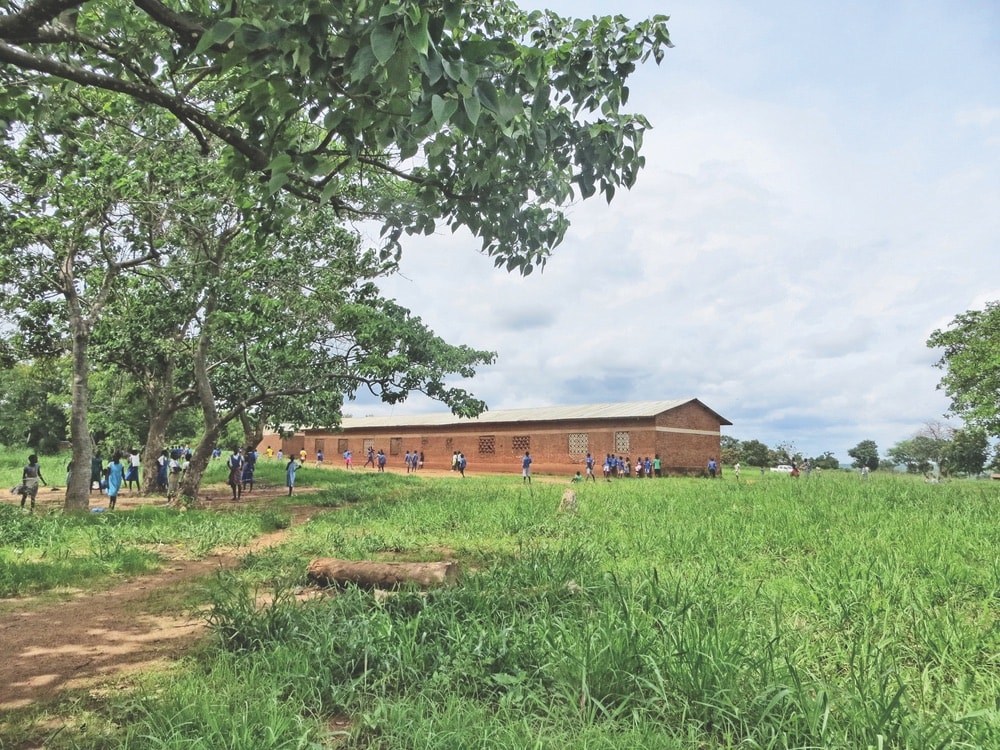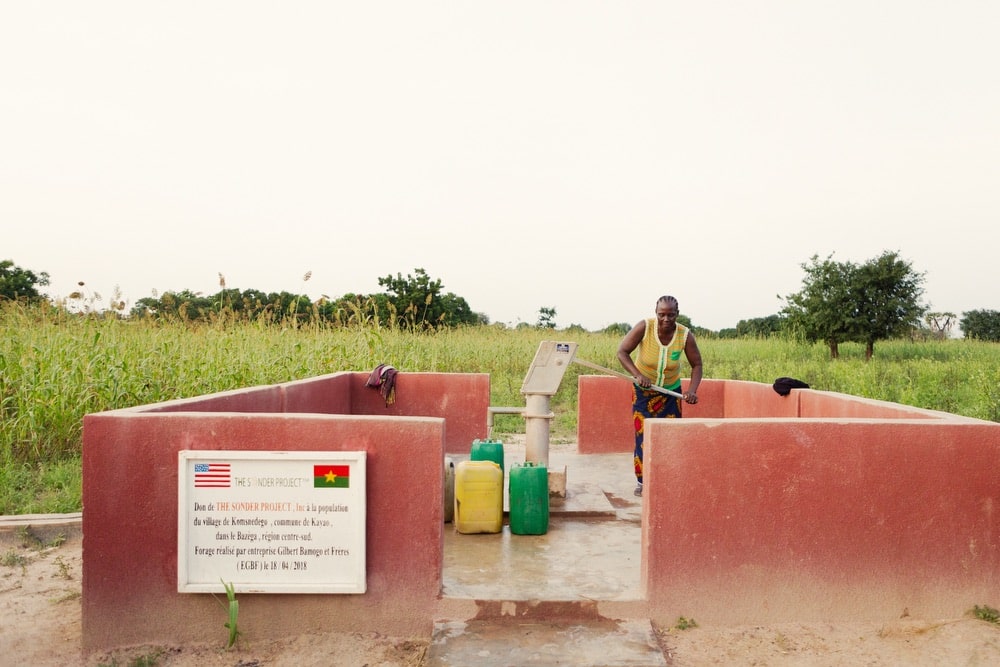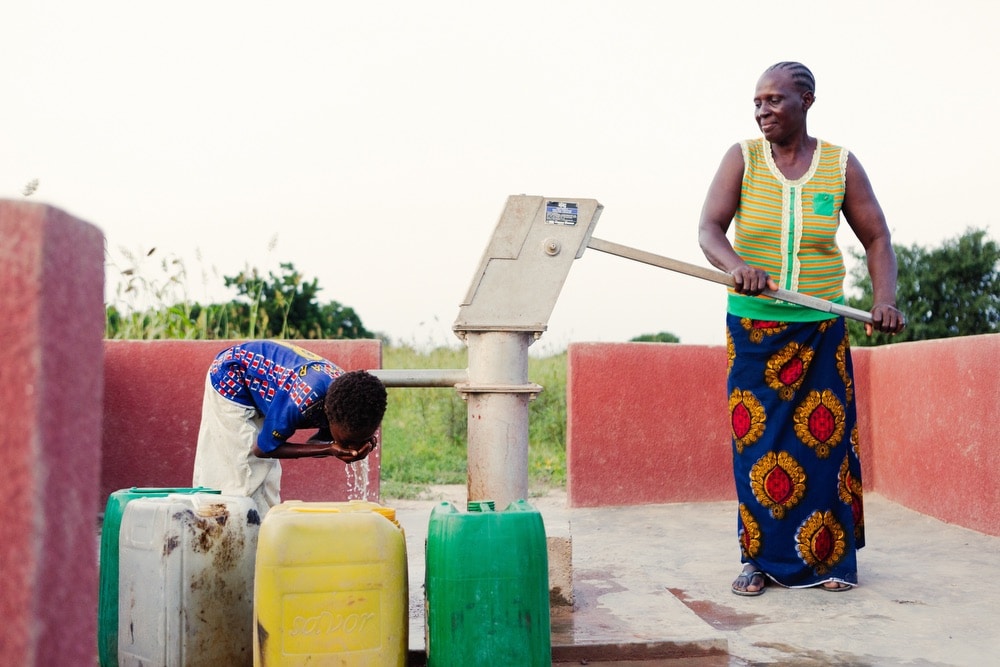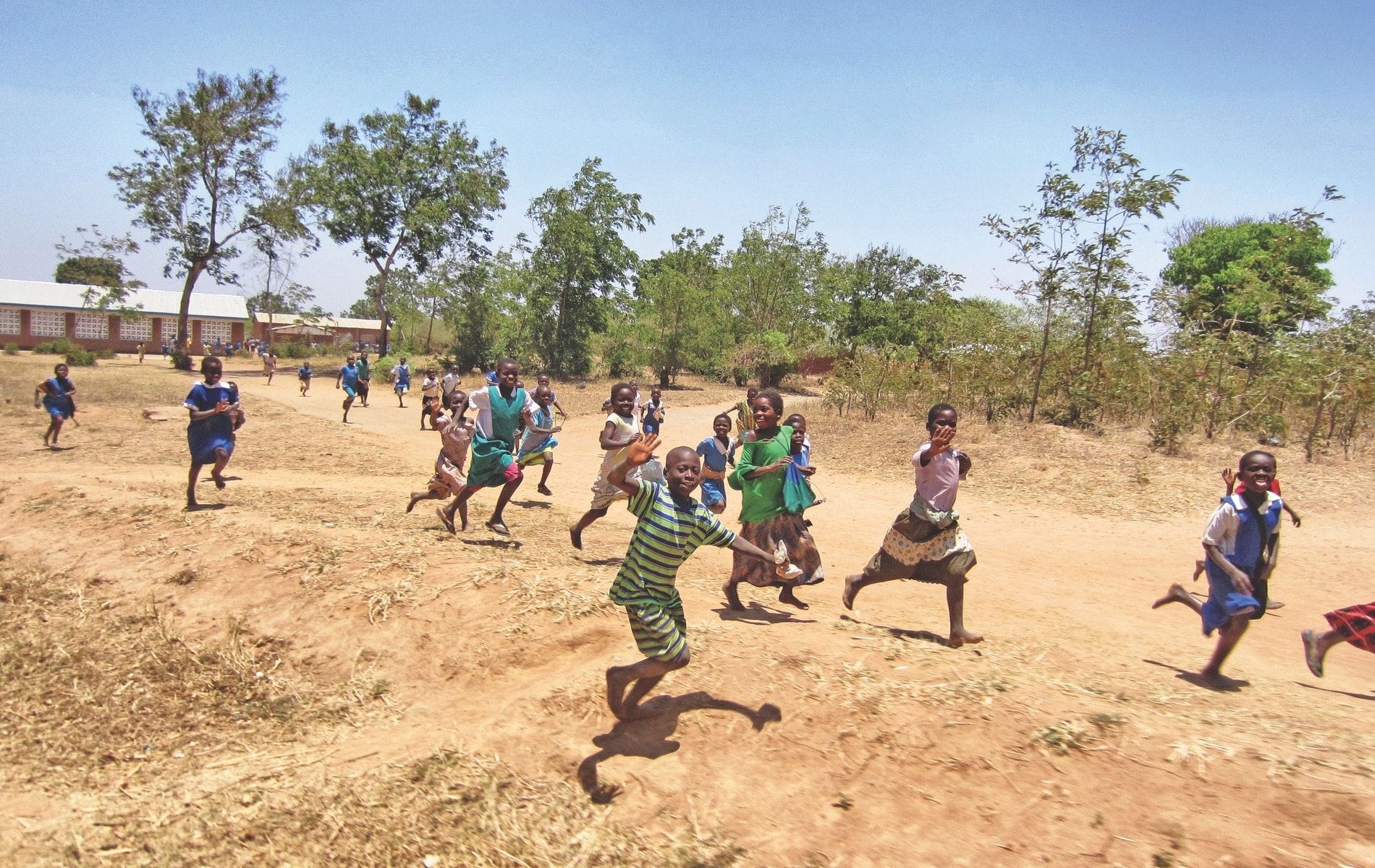
vie-magazine-sonder-project-hero-min
Children in Malawi wave as they run outside of a newly established school.
Building a World of Goodness
The Sonder Project Presses On
Interview by Jordan Staggs | Photography courtesy of The Sonder Project
When founding their US-based nonprofit organization, The Sonder Project, Jason Sprenkle, Ashley Horsley, and Jeremy Sprenkle had a mission to provide the basic human rights of access to food, water, housing, and education to people in need. The name comes from the concept of sonder, which represents the realization that every person you encounter or randomly pass is living their own life, with complexities, emotions, thoughts, and problems just as vivid and important as your own.
Since its inception in 2014, The Sonder Project has worked internationally to promote education in communities in Burkina Faso, a West African nation with one of the lowest rankings on the United Nations Human Development Index. The nonprofit’s efforts grew in 2017 to include sustainability projects to help those communities with the issues of clean water and food security. It has built nine schools, installed fifteen water pumps, and created two irrigated farms abroad, while also establishing community gardens in the US and assisting with relief efforts after Hurricane Michael ravaged the Florida Panhandle in 2018. Now, The Sonder Project has turned its attention to expanding its projects in Malawi, where a group of volunteers joined another nonprofit, buildOn, to build a school in 2017.
Before the spread of COVID-19 racked the world, The Sonder Project established a new field office in Malawi, hired a local project manager, and began making plans to build a new school, create wells, and help with local farms. With an annual operating budget of about $400,000 for 2020, The Sonder Project relies on fund-raising, grants, and donations to keep its projects afloat, so every little bit helps!
We caught up with The Sonder Project CEO Chad Zibelman to learn more about Malawi, the nonprofit’s new field office there, and its plans for the future.
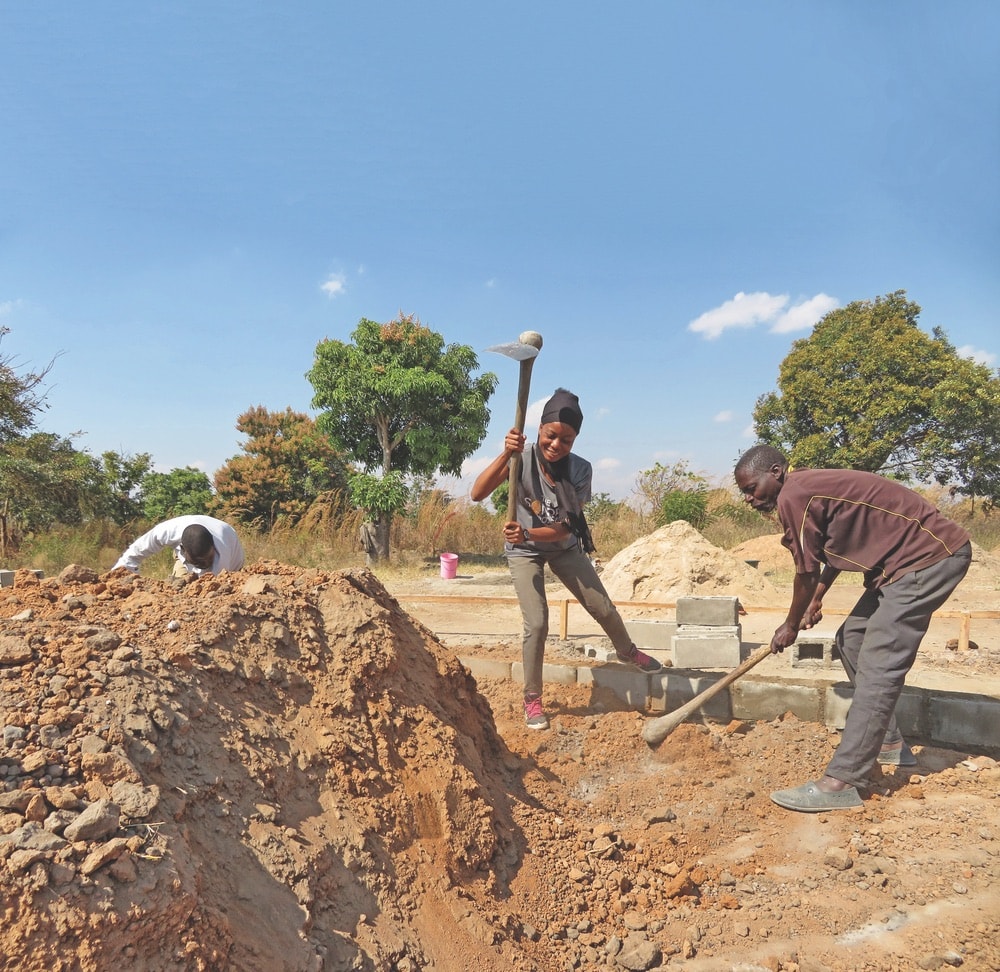
Beria Michembo, The Sonder Project’s Malawi project manager, works with a member of the community to build a new school.
VIE: How did you connect with the people in Malawi and recognize their needs?
Chad Zibelman: The need in Malawi is clear. According to the World Bank, Malawi’s GDP per capita was the third lowest in the world in 2019, ahead of only Somalia and Burundi, and their literacy rate of 62 percent puts them in 140th place out of 167 countries around the world. Additionally, Malawi ranks 172 out of 189 countries on the UN Human Development Index, which compares countries based on a variety of important development factors.
In 2019, we were seeking to expand beyond our partner country Burkina Faso because, unfortunately, the security situation in Burkina Faso is such that we are not able to bring groups there. A big part of why we started The Sonder Project was to connect our supporters to the communities we partnered with to help expand people’s understanding of the world and the importance of our mission. We considered a number of countries in sub-Saharan Africa, as we knew we wanted to grow within Africa, and Malawi stood out on our list. It was the only country in sub-Saharan Africa where The Sonder Project already had a connection, thanks to the school we had built with buildOn, and it has a relatively stable history and was safe for our volunteers to travel there.
To establish our program there, buildOn was also helpful in supporting our efforts by sharing contacts and advertising our job opening. We were able to put together our Malawian board of trustees—a requirement for us to register as an NGO in the country—to help oversee our work. I visited in January of 2020 to conduct interviews for our first hired position in-country and to confirm an office space. Our new project manager, Beria Michembo, started March 1 and works out of our office in Kasungu. buildOn is also based there, so we continue to work closely with a longtime partner.
- The Sonder Project board member Travis Meyer with students from Malawi, where the nonprofit built a school with partner buildOn in 2017
- A government-built school in Malawi
VIE: Tell us a little about your experience visiting Malawi in January.
CZ: Malawi is an incredible country. This was certainly not my first time there, so I am familiar with the place, but upon arriving, there is always a joy that washes over me. Malawi is often referred to as “the warm heart of Africa,” and that name comes from the friendliness of its people. On one of my earlier trips to Malawi, I stayed with a host family in a rural community, and as their host son, they had to give me a Malawian name. My host mother decided on Chimwemwe—which means “happy” in the local language, Chichewa—because I was always smiling. Chimwemwe is not only how I’ve come to be known in the country but also how I think of the country itself.
Depending on the time of year you travel to Malawi, you will gain a different perspective. The southern part tends to be more mountainous, green, and rugged. Particularly in the rainy season, it’s not uncommon for roads to be washed out or impassable, especially off the main thoroughfares. The same can be said of roads in the central and northern areas, but in the central part of the country, where we are currently focused, and outside the capital city of Lilongwe, the terrain tends to be flatter, with the occasional mountain or rock outcropping jutting from the horizon. Lilongwe is a sprawled city that has experienced a growth in cars on the road—be careful traveling during rush hour, because the traffic can put things at a standstill. As you get into the downtown area, you’ll find many people walking around, a big Western-style shopping plaza with a grocery store, and even some fast-food joints. We opted for the pizza; however, to better experience the culture, you have to eat at one of the open-air restaurants set up under makeshift tents. You can have your choice of nsima (the staple food, which is most commonly a porridge made from cornmeal), rice, or chips (fries). You may also select chicken or my favorite, chambo, which is a fish that comes from Lake Malawi, one of the largest freshwater lakes in the world. Of course, you always want to be careful eating at such venues and you definitely want to consider sanitation.
As you travel into surrounding towns, such as Kasungu, they tend to be relatively small, with one or two main streets, concrete shops built off the road, and dirt and dust—or mud, depending on the time of year. If you look closely in the countryside, there are usually fewer cars and more bikes and motorcycles. In the villages, the pace of life is slow, and the homes vary in construction from thatched roofs or corrugated steel with walls made of packed earth or bricks. Most everyone in the countryside is a subsistence farmer, so again, depending on the season and especially if there have been good rains, there will be crops everywhere. People rely on the harvest to survive throughout the year.
As peaceful as life in the village can be, it can also be quite difficult. Water is often hard to come by, and clean water even harder, sometimes taking hours in a day to collect. Schools may not have adequate structures, and there are only small shops available that often resell items from town. In terms of wildlife, if you look carefully while driving through, you may be lucky to catch sight of baboons in the distance.
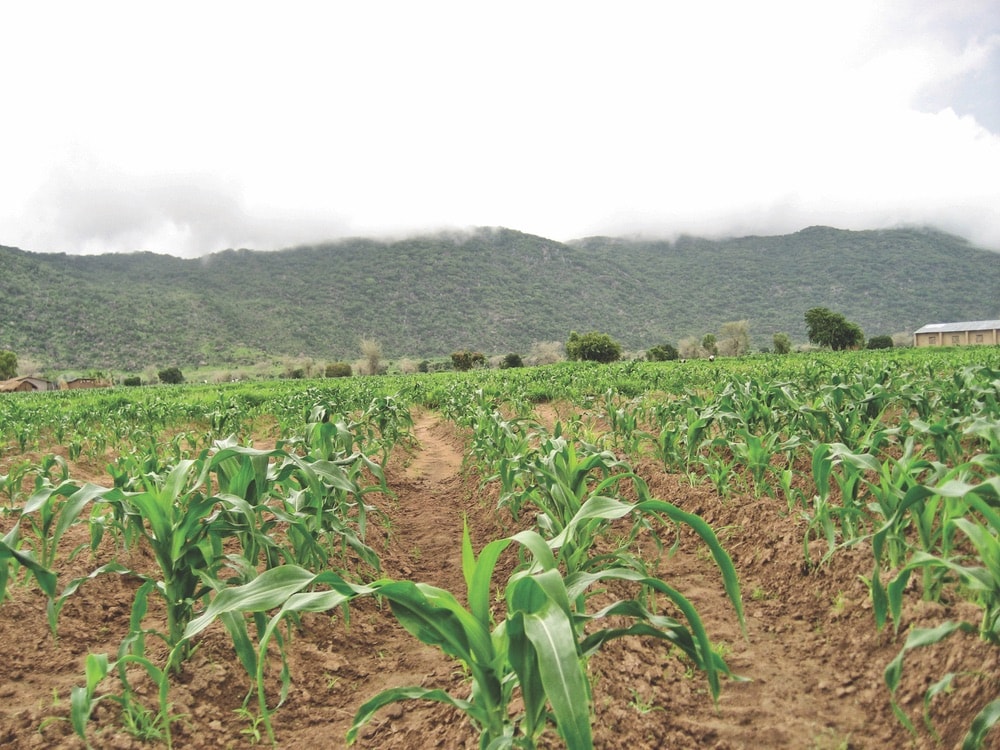
The Sonder Project works with partner communities to create, improve, and sustain farms.
VIE: How many partners or volunteers do you have in Malawi? What are their daily goals while The Sonder Project’s US team are unable to travel there?
CZ: We currently have one full-time project manager and two volunteer trustees who advise our work in Malawi. The lack of trips from the US does not impact our ability to do our work. As we are just starting our programs in Malawi, our focus has been on partnering with buildOn to build two schools in 2020. The first school broke ground on June 16, and we plan to break ground on the second school in the fall. Additionally, we are planning to partner with at least three communities this year to install deep wells affixed with manual hand pumps to increase access to clean water. Our project manager has been busy visiting and assessing over ten different communities that have been identified as having a need. Then she conducts a needs assessment by walking the community and talking with its members so we can decide on which communities to work with. Lastly, since the COVID-19 pandemic, we have been conducting educational workshops around the disease and have been instructing communities on how to build Tippy Tap hand-washing stations—which are very simple to make out of local materials—and encouraging community members to wash their hands in areas without running water.
We considered a number of countries in sub-Saharan Africa, as we knew we wanted to grow within Africa, and Malawi stood out on our list.
VIE: Do you work directly with government agencies in your partner regions? What are the biggest challenges you face when planning how to aid the citizens of your partner regions?
CZ: Yes, connecting with government agencies and other nongovernmental organizations is an important part of our work. Partnership is one of our core values, and we believe it to be critical to both making a connection and supporting sustainability. At times, connecting with government agencies can be slow and require a number of formalities, but going through this process is essential to build trust and relationships in the countries where we work.
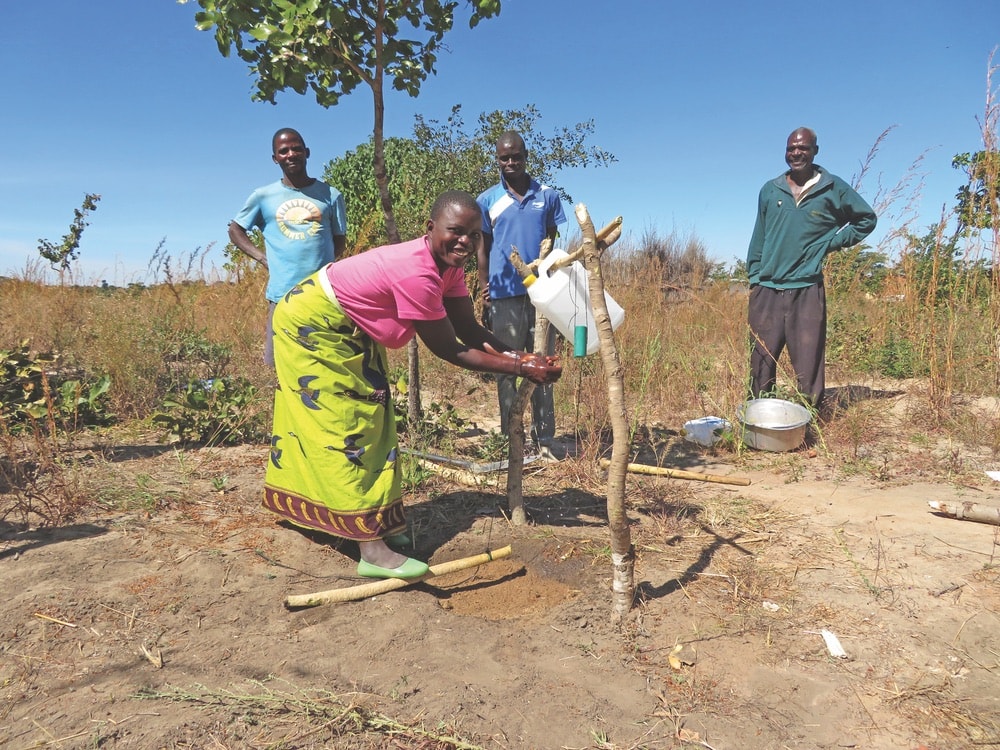
Since the spread of COVID-19 began, The Sonder Project has worked with communities in Malawi to build Tippy Tap hand-washing stations like this one.
VIE: With the added challenge of COVID-19 impacting the globe this year, how is The Sonder Project pivoting to meet the needs of communities during this time?
CZ: As I mentioned, we conduct educational workshops on the disease and how to build Tippy Tap hand-washing stations. As part of these trainings, we’ve created handouts that we’ve printed and laminated to be distributed in the local communities. These provide information and tips on disease prevention. We’ve also had to adjust our protocols. Considering our staff travel from larger towns and the communities we partner with tend to be more isolated, our biggest fear is being responsible for transmitting the disease. As a result, we’ve set protocols that staff are expected to wear masks, refrain from shaking hands, and always wash or sanitize their hands before interactions. This is also why our educational workshops have become important to the local communities, so they understand why our staff members act the way they do. It’s not that people haven’t heard about COVID-19, as villages tend to get information from the radio and via word of mouth, but it’s not uncommon for there to be myths to dispel. As trusted partners, we take our role seriously as ambassadors for the community and reliable sources of information.
Obviously the virus prevents our volunteers from traveling to Malawi at this time. We hope to hold our next school-building trip in the summer of 2021, but exact dates are yet to be determined.
- A community well built by The Sonder Project for citizens of Burkina Faso
- A community well built by The Sonder Project for citizens of Burkina Faso
VIE: We are very excited to have The Sonder Project as one of the nonprofit partners for the VIE Beach House – A Show Home, coming to Seagrove Beach, Florida, this fall. As a beneficiary, The Sonder Project will receive a donation from the show home’s developers in appreciation of the terrific Hurricane Michael community relief efforts your organization has spearheaded since October of 2018. Can you give us a brief rundown of those initiatives and their progress?
CZ: We plan to have all of our Hurricane Recovery Funds spent by the end of August 2020. In total, we have helped 220 households in Northwest Florida through our recovery efforts. We plan for our future donations to go toward our global initiatives. Depending on the funds received, we hope to be able to build a school and/or establish a well through the donation from the show home!
— V —
Visit TheSonderProject.org to learn more, donate, or get information about volunteering. To learn more about the VIE Beach House – A Show Home, visit VIEmagazine.com/BeachShowHome.
Share This Story!
KEEP UP WITH THE LATEST STORIES FROM VIE



